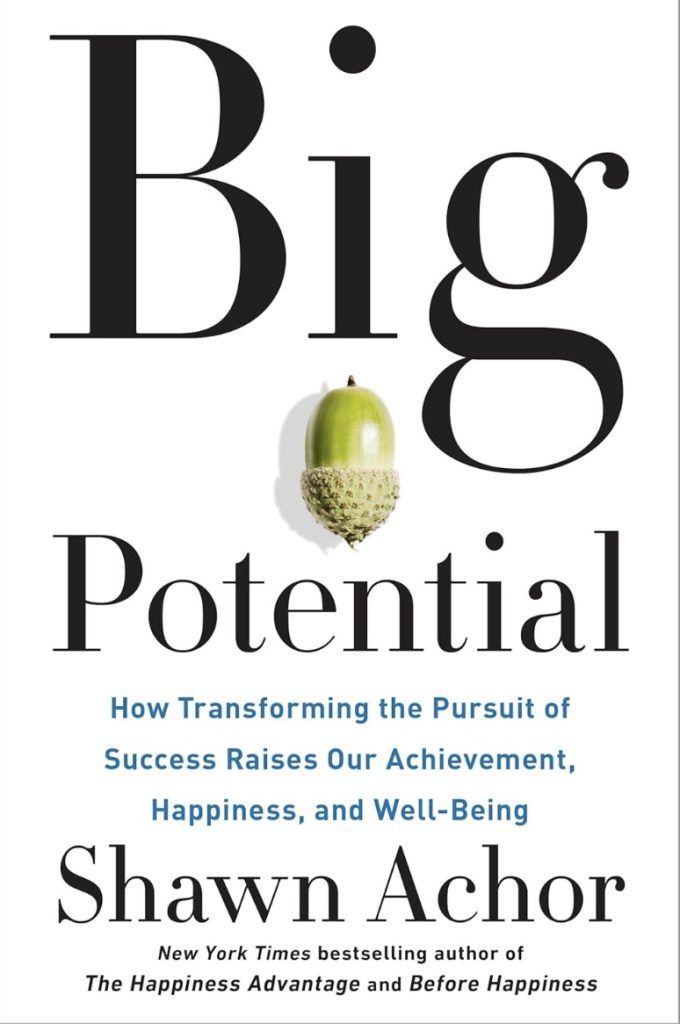“Celebration is the oxygen of Big Potential. And if we want to sustain the gains we have achieved, we need to keep breathing it in. We need to remember that whatever seat we sit in, we have the power to create change worth celebrating” (p. 209).
Key Points and Concepts
The Invisible Ceiling of Potential
There are two kinds of potentials according to Achor (2018).
1. Small Potential has a ceiling and is the limited success you can achieve alone (p. 24).
2. Big Potential is the success you can achieve with others in a Virtuous Cycle (p. 24).
A “Virtuous Cycle” occurs when one success leads to another within each person’s ecosystem. It is “an upward spiral of potential whereby with each success, you garner more resources, which, in turn, allow you to achieve greater and greater successes” (p. 51).
By placing emphasis on individuals rather than a team, potential is limited by an invisible ceiling, but this ceiling can be lifted by working with others. Collaboration raises not only the performance of the person but the group as a whole (p. 24).
Achor discovered that the main formula for success was, indeed, social connection. In two separate studies conducted at Harvard University and Google titled “Project Aristotle”, it was concluded that one could throw away all other previous assumptions of success whether it was grade point average, SAT scores, or college degree. The main contributor in long term and sustained success was the ecosystem, or support system, one was surrounded by (pp. 33-37).
“Project Aristotle” found that high social sensitivity and an environment where everyone felt equal and safe sharing ideas led to teams achieving their highest levels of performance (p. 37).
Achor and his research team discovered something in their research: the highest possible potential one can achieve is far greater than that of a single individual. Big Potential is achieved within the proper ecosystem. Therefore, Big Potential is something that everyone can tap into with the help of others (pp. 38-43).
The key to Big Potential is SEEDS: Surround, Expand, Enhance, Defend, Sustain.
Surround Yourself with Positive Influencers
Potential is created and formed by the ecosystem one immerses themselves in, and individuals are influenced and shaped by his/her surroundings.
According to research from Nicholas Christakis of Harvard Medical School and James Fowler from UC San Diego, if a person becomes happier, then any friend within a one-mile radius would be 63 percent more likely to also become happier (p. 40).
“Connecting with high-potential people dramatically increases your likelihood of high-potential outcomes” (p. 41).
Being surrounded by happy people does not ensure happiness but evidence states that it significantly improves one’s chances (p. 40).
Because individuals are so heavily influenced by his/her ecosystem, the height of potential is predicated upon others within the ecosystem. By surrounding oneself with people who lift others rather than drag them down, the ceiling of potential is raised to new heights (p. 63).
“All too often, we get so focused on showing off our individual strengths that we underestimate the greater strength that comes from the people we surround ourselves with” (p. 66).
Instead of rewarding individual performances and accomplishments in the workplace, it is essential to incentivize making others better. So instead of asking questions like “how many points did you score?” it is more important to ask “how did you help your team win?” (p. 67).
Achor writes, “The conclusion of a decade of my work is clear. You can be a superstar; you just can’t be one alone. What you need is a star system: a constellation of positive, authentic influencers who support each other, reinforce each other and make each other better” (p. 68).
Expand Your Power
Many organizations have created the myth that only certain people are capable of creating change. This creates the false dichotomy between managers/business leaders and other employees. This is a small potential mindset as it handicaps certain employees into believing they are incapable of doing something great (p. 88).
There really is no limit to what everyone in a system can achieve when they share the belief and mindset that they can create change. “We need to free ourselves from the tyranny of labels if we are to achieve big potential” (p. 90).
Time and energy are limited but the demand on them are endless. An individual cannot meet the necessary demands unless responsibility of leadership is shared among a team with everyone having a stake in the mission. Thus, it is necessary to expand responsibility (p. 91).
“It all starts with one cardinal rule for expanding power: for power to expand it needs to be recognized, desired and reinforced” (p. 92).
Enhance Your Resources
Praise is a renewable resource that creates a Virtous Cycle. By enhancing others through praise, it is then shared with others and, ultimately, returns to the point in which it began (p. 117).
Praise, however, is often handled the wrong way. Responses to praise typically include deflection, likely out of humility, or absorption due to the belief that it is limited. It is essential to not extinguish the light of praise by denying it but to bend that light towards others and magnify it (pp. 118-119).
Organizations today often overemphasize praising the top performers instead of collective efforts of the team. For example, recognizing the top performers at a companywide meeting when the support system of the top performer deserves equal credit for the successes. The expectation is for that praise to trickle from the top down instead of flowing freely in all directions (p. 119).
Big Potential shines a spotlight on the support system that makes high performance possible. The saying “we succeed together or fail alone” is the core of Big Potential (pp. 130-132).
Defend Against Negative Influences
Big potential is not simply about being positive or happy but recognizes the need for what are considered negative emotions such as sadness, fear, and anger. It is vital, however, to use these emotions to recognize what needs to change. For example, sadness can help someone recognize that he/she is lonely and that it is important to reach out to friends for support. The most dangerous emotion is actually the lack of emotion, or apathy (pp. 146-147).
As previously discussed, individuals are heavily influenced by their ecosystem. Just like happiness, stress and anger can also spread the same way. Being surrounded by only negative and stressful people can alter positive emotions quickly. Thus, it is not only vital to be surrounded by positive forces but to defend against negative ones (pp. 149-150).
Achor (2018) discusses ways to defend against negative influences and emotions:
• It is essential to unplug from modern technology where social media and news cycles take away from positive emotions (pp. 152-158).
• Express gratitude daily that leads to a mental stronghold (pp. 158-160).
People only stress about things they care about, so it is important to chase meaning and focus on why we care about something. For example, a husband may stress about returning an item of clothing for his wife because it is an additional errand to run. By focusing on the positive, and finding meaning in these tasks, such as saving his wife time to give her the ability to concentrate her time on more important things because he loves her, it turns stress into something positive (pp. 164-166).
Research shows that taking time away from work actually increases productivity. This time away has proven to create a positive brain that results in a 31 percent increase in productivity. A Harvard Business Review article based on a decade of research states that “the greatest competitive advantage in the modern economy is a positive and engaged brain” (pp. 172-173).
Sustain the Gains
Pulling people and helping them channel their energy positively is the key to sustaining the momentum toward Big Potential. Big Potential does not stand still but is a continuously moving dial (pp. 180 – 183).
“The more energy they channel in a positive direction, the more power they have to pull others along with them” (p. 180).
The more stress a person has in his/her life, the more important it is for him/her to create meaning from it. By finding meaning and joy in these stresses the individual can sustain the gain of Big Potential (pp. 190-195).
Celebrate the victories, no matter how small (p. 200).
“Celebration is the oxygen of Big Potential. And if we want to sustain the gains we have achieved, we need to keep breathing it in. We need to remember that whatever seat we sit in, we have the power to create change worth celebrating” (p. 209).
Key Messages for Management and Leadership
SEEDS (Surround, Expand, Enhance, Defend, Sustain) helps people achieve a Virtuous Cycle for Big Potential and lift the ceiling of potential higher (p. 53).
When a person helps those around him/her become better, they raise not only the collective performance of the group but that of everyone in it. Thus, the greatest potential is reached not individually, but with the support of others (p. 38).
It is better to be a good player on a great team rather than a great player on a bad team (p. 48).
A person’s ecosystem is the most important factor in achieving Big Potential.
Big Potential is not about “survival of the fittest” but “survival of the best fit” (p. 33).
Everyone is capable of Big Potential when they are surrounded by the right people.
Big Potential is a continuous, lifelong pursuit.
Achor, S. (2018). Big Potential: How Transforming the Pursuit of Success Raises Our Achievement, Happiness, and Well-Being. New York: Random House.

“Being surrounded by happy people does not ensure happiness but evidence states that it significantly improves one’s chances.”
There really is no limit to what everyone in a system can achieve when they share the belief and mindset that they can create change. “We need to free ourselves from the tyranny of labels if we are to achieve big potential.”
“Celebration is the oxygen of Big Potential. And if we want to sustain the gains we have achieved, we need to keep breathing it in. We need to remember that whatever seat we sit in, we have the power to create change worth celebrating.”
“When a person helps those around him/her become better, they raise not only the collective performance of the group but that of everyone in it. Thus, the greatest potential is reached not individually, but with the support of others.”
